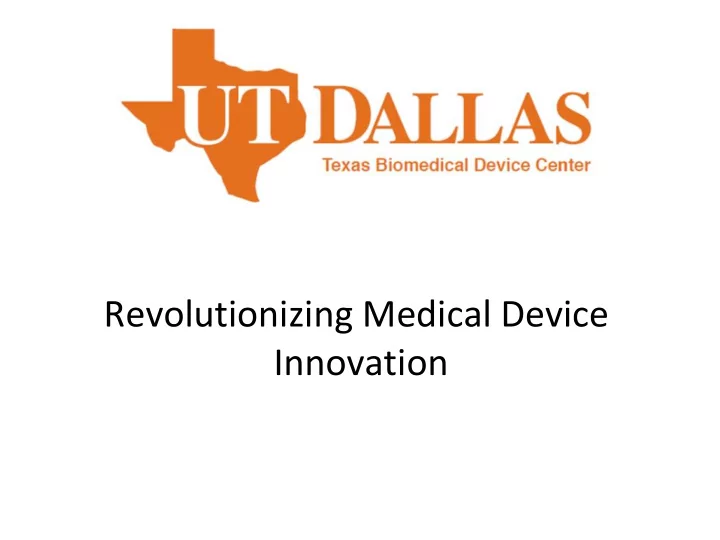

Revolutionizing Medical Device Innovation
Innovating to Win http://www.symmetrymagazine.org/article/february-2011/crossing-the-valley-of-death The Valley of Death for Medical Devices
Innovating to Win 1) To build meaningful and productive collaborations with clinicians and companies 2) Reduce risk so companies pull technology out of UTD 3) Leverage small seed grants from center into federal funding (~25X ROI) 4) Create a reputation that results in partnerships with donors and companies 5) Create talent that can enter the biomedical engineering workforce 6) Increase research publications to add value to technology and center 7) Recruit talent to increase bandwidth and skill sets 8) Develop corporate and individual support to sustain activities
Technology Pathway
TxBDC Research Success (Years 3.0) Center Productivity 2012-2013 • $12 Million in External Funding • DARPA, GlaxoSmithKlein, and NIH • 40 Peer Reviewed Publications • 4 Clinical Trials • 8 Pre-clinical Trials • 2 Commercial Devices Exiting this Year
Twentieth century medical innovation changed the world by focusing on infectious disease . Smallpox 400 million deaths Measles 97 million deaths Flu 76 million deaths Whooping cough 38 million deaths Tetanus 37 million deaths Meningitis 22 million deaths Hepatitis B 13 million deaths Diphtheria 1 million deaths Polio 0.1 million deaths World Health Organization
Twenty-first century innovation will change the world by focusing on brain disorders . Chronic Pain 700 million Anxiety 650 million Depression 350 million Drug Addiction 185 million Severe Tinnitus 70 million Traumatic Brain Injury 54 million Epilepsy 50 million Alzheimer's Disease 36 million Autism 34 million Stroke 33 million Parkinson’s Disease 10 million World Health Organization
Diphtheria Timeline of Vaccine Development Tuberculosis Whooping Cough Technology Yellow Fever Tipping Point Typhus Influenza Polio Japanese Encephalitis Anthrax Adenovirus Oral Polio Vaccine Measles Mumps Rubella Chicken Pox Pneumonia Meningitis Hepatitis B Influenza Hepatitis A Lyme Disease Rotavirus Papillomavirus Present 1921 1926 1932 1937 1945 1952 1954 1957 1962 1963 1967 1970 1974 1977 1978 1981 1985 1992 1998 2006
Young brains Timeline of Targeted Plasticity Therapy can change Adult brains can change Brain stimulation Miniaturized Wireless changes the brain Implant Plasticity rules discovered By 2018 Outpatient VNS-directed plasticity Procedure Tinnitus Therapy Developed First Human Clinical Trial Stroke Therapy Developed Technology PTSD Therapy Developed Tipping Point First Human Stroke Trial TBI Therapy Developed US Clinical Trial for Tinnitus US Clinical Trail for Stroke SCI Therapy Developed Pain Therapy Developed US Clinical Trial MS and SCI Clinical Trial Chronic Pain US Clinical Trial PTSD Future 1977 1991 1998 2003 2009 2011 2012 2013 2014 2016 2017 2018 2019 2020 2021
Therapeutic White Space Specific Circuit Precision DBS Brain TMS Region Drugs ECT Whole Brain Minute Week Year Duration
TPT Provides Specific and Long Lasting Changes in Function Specific TARGETED Circuit PLASTICITY Precision DBS Brain TMS Region Drugs ECT Whole Brain Minute Week Year Duration
Use The Bodies Natural Pathway To Enhance Learning
Stimulation of the Vagus Nerve Strengthens Active Circuits Neural Acetylcholine + Norepinephrine + Experience VNS Plasticity Nucleus Locus Basalis Coeruleus Vagus Nerve
VNS paired with Motor Rehab
VNS paired with Stroke Rehab Strengthens The Circuits Generating Those Movements
VNS paired with Stroke Rehab
These Brain Changes Lead to Motor Function Improvement
Targeted Plasticity Therapy Enhances Motor Recover Following Stroke in Animals Aged Stroke Chronic Stroke Unpublished Unpublished
Targeted Plasticity Therapy Enhances Motor Recover Following Stroke and TBI in Animals TBI: Handle Pull Task * * *
Targeted Plasticity Therapy Enhances Motor Recover Following Different Types of Strokes in Animals TBI: Handle Pull Task
Potential VNS-facilitated Therapies Tones + VNS - Tinnitus Speech therapy + VNS - Communication disorders Touch + VNS - Chronic Pain Skilled movement + VNS - Motor Impairments Cognitive therapy + VNS - Cognitive Impairments Desensitization therapy + VNS - PTSD / Anxiety Auditory Rehab Motor Rehab PTSD Rehab
Stroke Clinical Trials
Post VNS Therapy
Pre and 1 Month Post
Pre and 7 Months Post https://vimeo.com/106525058 micro1
Innovations https://vimeo.com/106525058 micro1
Innovations Reduce cost and size so it is minimally invasive and readily available. Provide from a non-profit Next Year
Innovations Center Productivity 2012-2013 Flexible Electronics and Advanced Materials
Innovations Center Productivity 2012-2013 Clinical Trial at UTSW Exiting the University This Year
PTSD with USC
VNS for Tinnitus Overview The therapy pairs each tone played via headphones with a burst of vagus nerve stimulation. Over time, this will alter the neurons in the auditory cortex and reduce the perception of tinnitus in the patient. page 31
Center Faculty Involved in Targeted Plasticity Initiative Rob Rennaker, Ph.D. Director Mike Kilgard, Ph.D. Assoc. Director Jane Wigginton, MD Chief Medical Officer Diana Easton, Ph.D. Director of Regulatory Affairs Elliot Frohman, MD Ph.D. MS Teresea Frohman, PA-C MS Hunt Batjer, MD Neurosurgeon Stroke and Parkinson’s Disease Seth Hays, Ph.D. Sven Vanneste, Ph.D. Tinnitus Christa McIntyre, Ph.D. Post-Traumatic Stress Disorder Ted Price, Ph.D. Chronic Pain Walter Voit, Ph.D. Materials Science Shalini Prasad, Ph.D. Sensory Technology Mario Romero-Ortega, Ph.D. Peripheral Nerve Injury Stuart Cogan, Ph.D. Biomedical Devices Patrick Ganzer, Ph.D. Spinal Cord Injury Dane Grasse, Ph.D. Wireless Implant Technology
Recommend
More recommend